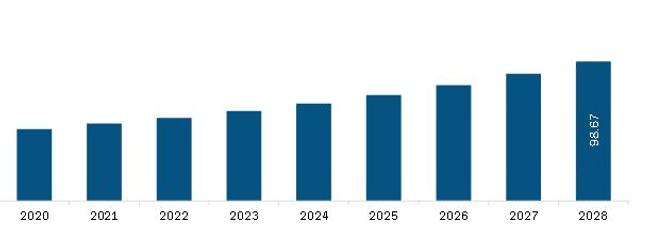Asia Pacific industrial automation market is expected to reach US$ 98.67 billion by 2028 from US$ 54.73 billion in 2021; it is expected to grow at a CAGR of 8.8% from 2021 to 2028.
Machine vision users and systems integrators have had access to better imaging, optics, and illumination software for nearly the last 40 years. Although machine vision is a relatively mature technology, lower component, software, and engineering costs; greater simplicity of use; and the expanded range of applications continue to drive its acceptance across various industries.
In 2021, amid the adversities posed by the COVID-19 pandemic, manufacturers accelerated the deployment of machine vision technology for the automation of industrial processes to keep operations running as effectively as possible and keep up with the increasing demand as businesses scrambled to bolster digital infrastructure, supporting remote workers. Additionally, the demand for logistics-related apps increased due to the surge in online purchases from 2020. Imaging systems in retail distribution centers, and automated warehouse storage and retrieval systems, and manufacturers of PPE-related items, such as face masks, face shields, protective garments, and respirators were among them. In the industrial sector in Asia Pacific, machine vision systems are also adopted in automated predictive maintenance, packaging inspection, automated barcode reading, product and component assembly, defect reduction, and 3D vision inspection.
With new features and technologies, vendors can attract new customers and expand their footprints in emerging markets. This factor is likely to drive the Asia Pacific industrial automation market at a good CAGR during the forecast period.
Asia Pacific Industrial Automation Market Revenue and Forecast to 2028 (US$ Billion)

- This FREE sample will include data analysis, ranging from market trends to estimates and forecasts.

- This FREE sample will include data analysis, ranging from market trends to estimates and forecasts.
Asia Pacific Industrial Automation Market Segmentation
The market for Asia Pacific industrial automation market is segmented into component, system and end user. Based on component, the Asia Pacific industrial automation market is segmented into hardware and software. Based on system the Asia Pacific industrial automation market is segmented into supervisory control and data acquisition, distributed control system, programmable logic control and others. Based on End User the Asia Pacific industrial automation market is segmented into oil & gas, automotive, food & beverage, chemical & material, aerospace & dense and others. Geographically, the Asia Pacific industrial automation market is segmented into Asia Pacific (China, India, Japan, South Korea and Rest of APAC).
Asia Pacific Industrial Automation Market Companies
ABB Ltd, Hitachi, Ltd., Mitsubishi Electric Corporation, OMRON Corporation Rockwell Automation, Inc. , Siemens , Yokogawa Electric Corporation ,Koyo Electronic Industries Co., Ltd. , Industrial Automation (M) Sdn Bhd , and Emerson Electric Co. are among the leading companies in the Asia Pacific industrial automation market.
Asia Pacific Industrial Automation Report Scope
| Report Attribute | Details |
|---|---|
| Market size in 2021 | US$ 54.73 Billion |
| Market Size by 2028 | US$ 98.67 Billion |
| Global CAGR (2021 - 2028) | 8.8% |
| Historical Data | 2019-2020 |
| Forecast period | 2022-2028 |
| Segments Covered |
By Component
|
| Regions and Countries Covered | Asia-Pacific
|
| Market leaders and key company profiles |
- Historical Analysis (2 Years), Base Year, Forecast (7 Years) with CAGR
- PEST and SWOT Analysis
- Market Size Value / Volume - Global, Regional, Country
- Industry and Competitive Landscape
- Excel Dataset


- Single Pair Ethernet Market
- Customer Care BPO Market
- Health Economics and Outcome Research (HEOR) Services Market
- Integrated Platform Management System Market
- Mail Order Pharmacy Market
- Sodium Bicarbonate Market
- HVAC Sensors Market
- Nuclear Decommissioning Services Market
- Sterilization Services Market
- Long Read Sequencing Market

Report Coverage
Revenue forecast, Company Analysis, Industry landscape, Growth factors, and Trends

Segment Covered
This text is related
to segments covered.

Regional Scope
North America, Europe, Asia Pacific, Middle East & Africa, South & Central America

Country Scope
This text is related
to country scope.
Trends and growth analysis reports related to Electronics and Semiconductor : READ MORE..
- ABB Ltd
- Hitachi, Ltd.
- Mitsubishi Electric Corporation
- OMRON Corporation
- Rockwell Automation, Inc.
- Siemens
- Yokogawa Electric Corporation
- Koyo Electronic Industries Co., Ltd.
- Industrial Automation (M) Sdn Bhd
- Emerson Electric Co.
 Get Free Sample For
Get Free Sample For